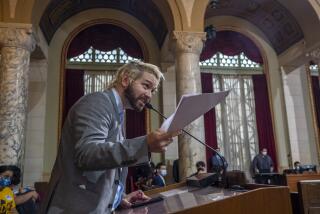Firing of library worker causes uproar
Many in the Central Valley farm town of Lindsay were shocked when a man was arrested after allegedly viewing photos of nude boys on a computer in the local library.
But even more shocking was the dismissal two days later of the library branch’s lone employee, who said she alerted police over the objections of her supervisor.
The firing of aide Brenda Biesterfeld has prompted a prayer vigil outside the library, a stinging letter from the City Council to Tulare County officials, rumblings about the town of 11,000 breaking off from the county library system and a wave of anger throughout the community
On Tuesday, an organization promoting “family-friendly” libraries honored Biesterfeld, 46, a single mother of two, before the Lindsay City Council. Attorneys connected with a conservative legal group based at Jerry Falwell’s Liberty University have taken up her cause, threatening to sue the county. Local firefighters are talking about giving her some of the proceeds from a department fundraiser next month.
“As a community, we are extremely upset,” said Suzi Picaso, a Lindsay councilwoman and former president of the local chamber of commerce. “We want to make sure that people who move here know we have policies in place to keep our children safe. If the library’s policy is to not report such viewing, then we might have to break our partnership with them.”
County officials Tuesday offered to have the dispute mediated by a retired judge. They say there is no policy that keeps librarians from reporting child pornography and that Biesterfeld’s firing -- which occurred two weeks before her six-month probation was to end -- had nothing to do with her report to police. Unless she consents to disclosure of her personnel files, however, privacy laws prevent them from proving their point.
“She can say whatever she chooses, and we can’t respond,” said Tulare County Counsel Kathleen Bales-Lange. Biesterfeld could not be reached for comment.
An attorney for suspect Donny Lynn Chrisler said there was no evidence that his client did anything wrong at either the library or his home, where authorities said they found a number of explicit images after his arrest. Chrisler, 39, is a library regular who is deaf. A diagnosed schizophrenic, he is being held at Tulare County Jail on $100,000 bond.
By Biesterfeld’s account, the uproar started Feb. 28, when she saw Chrisler staring at photos of naked, blond boys. She was sickened, she said, and called her supervisor, Judi Hill. According to Biesterfeld, Hill told her to give the man a note ordering him to stop. When Biesterfeld suggested calling the police, Hill told her not to do it, her attorneys said.
But the next day Biesterfeld, nagged by doubts, used her lunch hour to visit the police station next door. She was told to contact the station if the same thing happened again, said Mathew Staver, one of her attorneys. “She was doing the moral and legal thing that anyone would do,” he said. “When you see someone viewing child pornography, you report it to the proper authorities.”
On March 4, she called police when she saw Chrisler allegedly viewing the same kind of images. Police arrested him and confiscated the computer as evidence. They then received an angry call from Hill, who told them they had violated Chrisler’s “privacy rights,” according to a letter Biesterfeld’s lawyers sent county officials.
Biesterfeld was fired March 6 for unacceptable performance -- an allegation her attorneys deny, pointing to a favorable job review six weeks earlier.
The brouhaha riled city officials. “Our alarm bells really went off when we heard of a library supervisor questioning the right of our Police Department to confiscate a computer and investigate a crime,” said City Manager Scot Townsend.
The incident also inflamed a widely held feeling in the area that many libraries are more willing to protect speech than patrons.
“Libraries are known to sweep these things under the rug,” said Councilwoman Picaso, contending that the American Library Assn. opposes restrictions on what computer users may view.
Mary Minow, a lawyer who specializes in library issues, disagreed. She said the library association unsuccessfully sued the government over requirements for Internet filters intended to block child pornography. But that was largely because the filters block too much -- including, she said, her own blog.
Child pornography is “not protected by the Constitution or the Supreme Court,” she pointed out: “When librarians witness a crime, they call the police.”
When it comes to explicit photos of adults, practices vary. Viewing such images is not usually illegal and libraries, such as one in Hawaii that threw out a patron looking at shirtless men on a gay website, have been sued for overreaching.
The distinction could come up in the Lindsay case. Roland Soltesz, Chrisler’s attorney, said that all but a few of the hundreds of printed-out images police found at his client’s house were of adult males -- and not illegal. Those that may have depicted children were found on web pages with numerous other photos, he said.
Soltesz cast the case as a test of civil liberties.
“When I go to the library and check out ‘Madame Bovary’ or ‘Lolita,’ a librarian can call the police and give them my library record just because she doesn’t like classics that deal with sexy topics,” he said. “That’s what’s frightening in this case.”
Biesterfeld’s supporters have a different view.
“It’s scary that an individual can think he’ll go into the library and just view these types of images,” Picaso said. “You can have any type of firewall you want, but the safest firewall was Brenda.”
More to Read
Sign up for Essential California
The most important California stories and recommendations in your inbox every morning.
You may occasionally receive promotional content from the Los Angeles Times.











